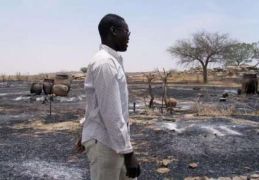First Darfur defendants say they innocent
By Opheera McDoom
NYALA, Sudan, June 21 (Reuters) – The first 10 defendents to be tried by Sudan’s special Darfur court said they were innocent on Tuesday, the second sitting of the court which Sudan hopes will avoid international trials for crimes in the remote region.

|
|
A displaced Sudanese man looks at his destroyed house after militiamen burnt the Sereaf village, in west Darfur along the Sudan and Chad border, April 22, 2005. (Reuters). |
The 10 members of the government-allied Popular Defence Forces aged between 18 and in their late 40s sat in the dock of the small, crammed court in the capital of South Darfur, Nyala, and listened to the testimonies of witnesses for the prosecution and a woman who said she was raped.
The 10 men from the Arab Rizeigat tribe are accused of armed banditry, injury, rape and robbery. Mostly dressed in the traditional long white garment called a galabiyya, they sat silent throughout the proccedings.
One witness identified two of them as present at the time of the attack. The rape victim did not positively identify her attacker and did not remain for the duration of the trial.
“We are not afraid,” the accused told Reuters after the proceedings. “We feel this is an easy case and we are innocent — the court will not take long to see that,” said defendent Moussa Osman.
Osman joined the PDF in 2000. The PDF are a force the government calls local army reserves, called up in times of rebellion. They belong to the army and are commanded by them.
But rebels and many of those displaced by the conflict say the PDF were part of the Janjaweed, the fierce Arab militia accused of a widespread campaign of rape, killing and looting in non-Arab villages.
Tens of thousands have been killed and more than two million driven from their homes into miserable camps in Darfur during almost 2-1/2 years of rebellion.
WAR CRIMES
The U.N. Security Council earlier this year requested the International Criminal Court (ICC) to investigate alleged war crimes in Darfur, the first such referral.
Sudan last week formed this special court to try people in Darfur, saying it would be a substitute to the ICC. It refuses to send its citizens to any court outside the country. The United Nations says the court will complement the ICC, but cannot be an alternative.
The treaty forming the ICC says any defendent tried in fair and credible national trials cannot be retried by the ICC which sits in The Hague. But the prosecution has so far identified only small-time criminals rather than the senior officials likely to be indicted by the ICC.
The 10 are accused of looting a bus and other vehicles carrying more than 100 people outside Nyala in December last year, not the crimes against humanity which a U.N.-appointed commission of inquiry found evidence of in their report to the Security Council earlier this year.
That inquiry documented testimonies of mass rape, executions and war crimes, but stopped short of agreeing with a declaration by the United States that the violence constituted genocide.
The head of the defence Abdel Hafiz Durunkie Mohamed, a local lawyer of 25 years, said he had at least eight witnesses.
The men said they had been in their village nearby when they heard fighting and saw smoke rising from heavy weapons. Many of them belonged to the PDF but were on home leave for a funeral in the village of Um Selaya, about 17 kilometres north of Nyala.
“We know that the rebels often attack from that side, so we gathered our sons who were armed and went to see what was happening,” Osman said.
They met army commanders and went with them to the site of the looted bus. The passengers began shouting that they were the ones who had attacked the bus and the police began beating them with their rifles.
The army officers tried to defend them but the police took them to their headquarters and arrested them immediately. They had been in jail ever since. “Three of us had our heads split open and they waited two whole days before allowing our family to take us to hospital,” Osman said.
